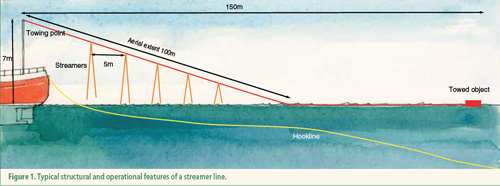Noriyosi Sato (National Research Institute of Far Seas Fisheries, Shizuoka, Japan) and colleagues, writing this year in the journal Fisheries Research have shown that paired bird-scaring lines (BSLs) are better at keeping albatrosses away than are single lines.
The paper's abstract follows:
"To examine the effectiveness of the paired tori lines (PT) for reducing seabird bycatch in pelagic longline fisheries, bait attack behaviors during PT deployment was compared with that during single tori line (ST) deployment. Detailed observations of seabird species abundance and attacks on baits were conducted from a longliner operating in the western North Pacific from December 2010 to January 2011. Line settings alternated between ST and PT deployments. About 90% of the seabirds attending the vessel were Laysan albatrosses (Phoebastria immutabilis), and most attacks were by this species. Attacks occurred across broad areas from 25 to 200 m of the stern during ST deployments, whereas PT deployment resulted in few attacks within 75 m of the stern. The number of secondary attacks (birds charging for the bait brought to the surface by the bird making the primary attack) was significantly lower during PT than during ST deployment. These results suggest that PT performed better than ST in reducing bait attacks, and consequently seabird mortality."

Reference:
Sato, N., Minami, H., Katsumata, N., Ochi, D. & Yokawa, K. 2013. Comparison of the effectiveness of paired and single tori lines for preventing bait attacks by seabirds and their bycatch in pelagic longline fisheries. Fisheries Research 140: 14-19.
For a related article click here.
John Cooper, ACAP Information Officer, 21 January 2013

 Español
Español  English
English  Français
Français